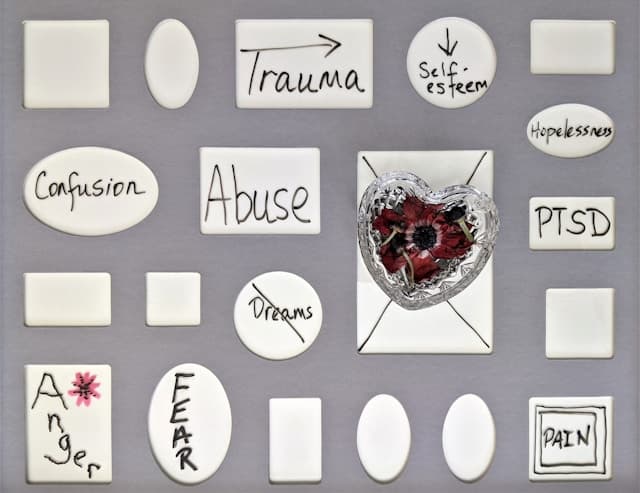Navigating Emotional Abuse, Divorce and Healing: I’ve Been There

Are you facing emotional abuse, divorce and healing through it?
Having been there myself I know how exasperating, confusing and heartbreaking it can be to navigate an emotional abuse divorce. Now on the other side, I also know that getting myself out of an emotionally abusive marriage was the best gift I ever gave myself.
Emotional abuse can be subtle and confusing to identify, so in this post I’ll share top signs of emotional abuse. I’ll also share some of the tips for healing from emotional abuse that have most helped me. If you’d rather listen than read, or if you want more details, listen to my solo podcast episode on this topic down below.
Emotional abuse and divorce

Let’s start by addressing some questions that may be on your mind:
What is emotional abuse, exactly?
A pattern of behavior that instills fear and control over another person through intimidation and manipulation. We’ll cover more in the section down below on signs of emotional abuse.
Is emotional abuse grounds for divorce?
Abso-freaking-lutely. In my experience, it’s so common in our cultures around the topic of divorce, to hear: but did he hit you? He hit you right? He must have hit you.
I outright got this question as I pursued my divorce and I wasn’t surprised. Knowing this would be the stick used to measure the validity of my divorce is in part what kept me in that relationship for far too long. Because no, there was no actual physical violence. There were times it came close, though.
Emotional abuse is often a precursor to physical violence. Please don’t wait around. If you’re seeking permission or validation to leave any relationship on the grounds of emotional abuse I support you one million percent. Emotional abuse is real, and is just as harmful if not more so than physical abuse.
Can emotional abusers change?
I used to think so. Perhaps they can, but only if they truly want to from within and for themselves.
For so long, I stuck around because my partner said he wanted to change. We also went to couples’ therapy (NOT a good idea in cases of abuse, I learned). I began to think my purpose was to facilitate his healing journey.
One day, I realized I wasn’t helping him by sticking around and I certainly wasn’t helping myself. I was enabling him. Who knows whether they actually will ever change, but by us sticking around we don’t give them any reason to do so.
In my personal experience, the more of their behavior we put up with the less likely they are to ever change. Why would they? And it’s not up to you to change them. No matter what trauma has led them to be this way, it is not your responsibility to heal them. Abuse in any form is never acceptable.
Signs of emotional abuse in a marriage
Emotional abuse can be tough to recognize when you’re in it. We can experience confusion and self-blame for a long time before waking up to what’s really going on – I certainly did. Here are some signs to look out for:
Constant criticism
Constant criticism and judgment is one key indicator of emotional abuse. You might begin to feel you can’t do anything right, even the most basic tasks. Maybe you’re being told how you do things, how you dress, how you speak, etc all are wrong.
What can make this tricky is the other person may tell you they’re pointing these flaws out to you as ‘feedback’ to help you improve. But when you look closer you can see the ‘feedback’ is just them telling you what to do based on their preferences.
This is very controlling behavior. Just because the person isn’t physically forcing you to do or not do something does not mean this is not controlling and manipulative behavior.
Do you find yourself walking on eggshells? Do you find yourself hyper monitoring things you say or don’t say, do or don’t do, just so you don’t incur their wrath or a barrage of criticism? This is not a healthy environment for you to be in.
If someone constantly makes you feel, or even outright tells you, that they’re the ones who know how to do everything right and you always do things wrong, that’s a them problem, not a you problem.
Minimizes your accomplishments

People who are emotionally abusive tend to be deeply insecure. What makes them feel better? Putting others down to make themselves feel superior.
They’ll take a so-what or a it’s-not-that-big-a-deal approach to your accomplishments. Or, they might ignore your achievements and recognitions entirely. Be extremely wary of people like this, who could never want good things for you.
Invalidates your feelings

Are you met with a, “you’re too sensitive,” or, “learn to take a joke,” when you express your feelings? Constant invalidation of your feelings is another sign of emotional abuse. It can be confusing to express that you’re feeling disrespected only to be told you’re overreacting.
I began to believe I was simply too uptight. All this did was increase how much disrespect I tolerated and for how long, as I tried to be more laid back and allow mean comments to slide.
This isn’t limited (none of this is) to romantic relationships alone. I had a similar experience with a roommate in university. Experiences like this affect your ability to stand up for yourself because your gauge for when you should be standing up for yourself becomes completely distorted.
If you find yourself constantly second-guessing yourself when it comes to whether or not you should speak up for yourself, or always telling yourself you’re too sensitive and need to learn to take a joke I urge you to reevaluate.
Find someone you trust and who you know cares about you, recount one or two of these exchanges for them and get their thoughts. Many times, it wasn’t until I recounted different conversations and situations and saw the expression on my loved ones’ faces that I realized how truly messed up my situation had been.
You feel ashamed
If the thought of recounting exchanges and anecdotes for friends and family makes you feel ashamed, take note. You might tell yourself, ‘they won’t truly understand because they weren’t there to have the context.’ You might find yourself editing parts out when you share about interactions with your partner.
Notice when you do this and be honest with yourself about what is compelling you to do so. What does this mean? What might happen if you laid it all out on the table honestly for your loved ones?
I always edited how bad our fights really were, the things that were said to me, everything when sharing with loved ones. I also was cautious about who I shared with. When I finally saw the writing on the wall and knew it was time to leave, that’s when I told the people closest to me everything.
I knew that once I spoke it aloud to my closest loved ones there would be no turning back. I realized at some level I had known that all along. Be honest with yourself.
Gaslighting

The term gaslighting comes from an old movie in which the husband tried to convince his wife that she was going crazy by slowly dimming the gaslights, but telling her she was imagining it all.
It’s frustrating as hell to experience it. It’s confusing and maddening. You literally start to question your reality. Someone might tell you you are misremembering certain conversations or details that you were sure you remembered accurately. Or they tell you that you took something out of context that you know you did not.
What’s important to remind ourselves of here is that this does not refer to one-off occurrences. Of course we all misremember or misread context now and then. But, every single time? Only with this person and no one else? Time to investigate.
In my own experience, I began to question my communication skills. I had always been commended for my clear and eloquent communication, my level of self awareness and my ability to understand others both at surface and on deeper levels. I studied and had a career in the field of communications.
And yet, I began to seriously question that entire part of my identity. I had never had trouble understanding or being understood by someone else to this degree before. Was it because this person’s communication style was SO unique? No. It was because they were consistently lying and redirecting.
This often shows up in arugments. When you’re talking about one thing and you start to make a lot of logical, rational sense you begin to believe you’ll finally come to a point of clarity. Instead, the person now says that’s not even what we’ve been talking about.
This is also largely about them planting seeds of self doubt. They might tell you that you don’t have a proper read on how you’re being perceived by others in group settings. This is actually a great opportunity to affirm or refute because you can get outside perspectives.
You could follow up, for example, in this case with the group of friends themselves and say something like, “Hey, I realize I might have come across as X, Y, Z the other evening. Is that right? Do I have a good read on that?”
Ask for verification outside of the person telling you this. Maybe they misread the situation themselves or maybe they want you to question your sense of self.
So, gaslighting is about getting you to question yourself. Your reality, your memory. If you’re feeling confused or frustrated or like you can never remember things the right way anymore then start documenting things as they happen as clearly as you can.
I look back at my journal entries from that time period, before I even realized what was going on, and I can clearly see how all of this was affecting my thinking and sense of self. It’s heartbreaking.
Intimidation

Another, perhaps more obvious indicator is yelling and name calling. I say perhaps more obvious because even this is something I hate to say can be rationalized. You can chalk it up to different communication styles.
I used to do a lot of research in forums about whether the way my partner fought should be acceptable to me and there would be people saying, “Hey, this is just how I talk. I don’t take it to heart.” So I would think – okay, some people communicate in these ways and don’t mean anything harmful by it, it’s just what they’re used to.
But just because some people aren’t bothered by name calling and yelling doesn’t mean I have to be okay with it. I had expressed my boundary multiple times and it was repeatedly crossed.
Besides, yelling, throwing things and slapping walls are intimidation tactics. These are not emotionally safe behaviors.
Another intimidation tactic is threatening, including a constant threat to the relationship through divorce or breaking up every time there’s an argument. When someone expresses a need or has a differing opinion and the response is, let’s break up, it can be really damaging to a relationship.
Additional signs
Above are some key signs of emotional abuse in a marriage, and ones I have personally experienced. You can find even more subtle signs of emotional abuse, as well as more information and support resources right here.
Emotional abuse recovery
Emotional abuse and divorce are both heavy experiences that you deserve to heal through. Here are some of the steps I took for my own emotional abuse recovery:
Free yourself from the emotional abuse cycle

First and foremost, get out. If you’re reading this article and looking into the details of emotional abuse and divorce, chances are you’re already in the process of doing so. I commend you, keep going.
You cannot heal and grow in bad soil. Change your situation, change your environment. For a while I tried to convince myself I could deal with my awful marriage and simply focus on making all the other parts of my life beautiful.
It wasn’t long until I learned it simply doesn’t work that way. One aspect of your life, especially such a central one as your marriage, will drag you down in all other aspects.
Get out.
Recognize emotional abuse in friendships, etc.
When there’s emotional abuse present in one relationship and we awaken to it, chances are we may begin to see where else such dynamics exist in our lives.
I began to notice other relationships, like friendships, relationships with family members and maybe even work relationships where there were similar patterns.
I ruthlessly cut people out or set very firm boundaries. I ceased to tolerate any ill behavior toward me anywhere else in my life.
Cultivate self love

Aside from relationships with others, rebuilding and nurturing a healthy relationship with self was a huge part of my recovery. I learned to love myself enough to never again allow myself to be treated so poorly, by showing me the respect and love I deserved all along.
I learned how to enjoy my own company and completely transformed my negative self talk into positive. How we treat ourselves determines how we allow others to treat us, too.
Individual therapy
I’m a strong proponent of therapy, after spending so much of my life considering it taboo. Individual therapy can help you heal through your emotional abuse divorce in an empowered and healthy way.
Talking with a professional, as well as with loved ones who you feel comfortable sharing with, about your experiences can be a helpful mirror to validate what you’ve gone through.
Rebuilding self worth
In addition to therapy, take time to build up your own self worth. There are a variety of techniques, including mirror work, shadow work and journaling. One huge step in rebuilding your self worth is that initial act of getting yourself out of an emotionally abusive situation because you deserve better.
Listen to the episode: Emotional Abuse Divorce & Healing
While I’m no longer recording new episodes of the Self Worth Edit podcast, you can still listen to this and all other episodes in the archives.
Questions we discuss in this episode include:
- Is emotional abuse domestic violence?
- Is emotional abuse worse than physical?
- Is emotional abuse grounds for divorce?
- How emotional abuse affects you
- What emotional abuse feels like
- How emotional abuse works
- What emotional abuse really means
- Why emotional abuse happens
- Why emotional abuse is ignored
- Why emotional abuse is hard to detect
- Will emotional abuse become physical ?
- Is it emotional abuse or am I overreacting?
- How to deal with emotional abuse
Related episodes:
5 Self Worth Lessons Divorce Taught Me